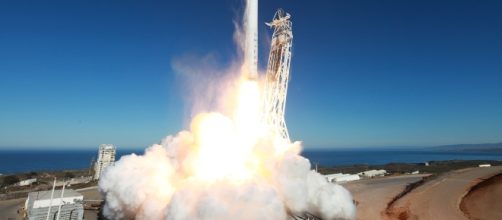If there's one thing SpaceX is good at, it definitely involves building and reusing rockets. The commercial space flight company founded by billionaire Elon Musk is set to debut its biggest rocket yet, the Falcon Heavy next year. But the businessman was quoted saying that there's a big risk involved with the launch.
For Musk, Rocket Launch failure is nothing new. And it seems like it is also applicable to the launch his new venture. Last Wednesday, he said in a conference that there's a "real good chance" of failure" pertaining to the 2018 launch.
Expectations vs Reality
Although SpaceX believes that the Falcon Heavy rocket will help revolutionize the space flight industry, its founder Musk also wanted to have a realistic expectation. Unlike former SpaceX rockets, the Falcon Heavy features three main boosters accompanied by 27 engines instead of just nine. All these engines and boosters are supposed to ignite at the same time for a successful launch.
The complex system makes it risky for the initial flight. There would be no crew on board the maiden lift off since some degree of failure is already expected as revealed by the founder. Musk even suggested that only brave men will volunteer to get on board the first Falcon Heavy manned flight in the future.
Moon bound rocket
The newly developed rocket would serve a different purpose unlike SpaceX Dragon tasked to deliver goods to and from the International Space Station (ISS.) According to CNBC, Falcon Heavy will try to transport two paying customers to the moon in late 2018. Musk still haven't shown interest in traveling to the moon but he revealed his plans to travel aboard his newest rocket to reach the ISS in the next few years.
Instead of just carrying scientific payloads to the space lab, SpaceX plans to use Falcon 9 and Dragon capsules to send astronauts to the ISS starting mid-20188. Currently, NASA, ESA and other space agencies worldwide rely on Russian Soyuz rocket to send crew teams to outer space.
Space flight spectacle
Despite the risk involved in the launch maiden flight, Elon Musk is encouraging everyone to visit Cape Canaveral to witness the liftoff. He said it will be "exciting" at the very least. He also revealed during last Wednesday's conference that there's a big chance that the rocket may not even reach orbit.
SpaceX admitted that the rocket was harder to build than they previously thought. But they pressed on because once operational, Falcon Heavy is capable of lifting twice the amount of payload compared to Falcon 9. It will also be powerful enough to lift the Dragon capsule to orbit around the moon.
Journey to Mars
It also looks like the rocket is not designed to send humans to Mars.
The businessman said he is open to competition when it comes to reaching the red planet. This means he is open to collaborations in order to reach the planet. Currently, China is also planning to go to Mars while Boeing is also developing transporters that are powerful enough for interplanetary travel. The SpaceX CEO said that his Mars plan is long-term and he will be revealing more details about it at a conference in Australia this coming September.
"Going to Mars is not for the faint of heart," Musk said in the conference. "It's risky, dangerous, uncomfortable and you might die. Now do you want to go? For a lot of people, the answer is going to be hell no, and for some, it's going to be hell yes."


